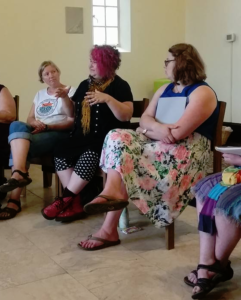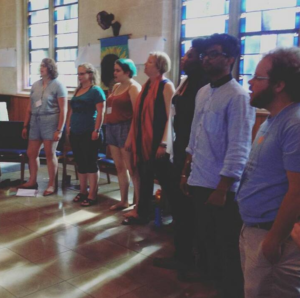by Chris Casuccio
“White supremacy is an overwhelming crisis for humanity, one that is making it impossible for any human to evolve in right relationship with the planet and the species. It has not, and will not, be resolved merely by Black and other non-white people fighting for a change – it must be unlearned, relinquished by those who walk with the privileges of whiteness.” – adrienne maree brown
“We need you defecting from White supremacy and changing the narrative of White supremacy by breaking White silence.” – Alicia Garza
“White people will have quite enough to do in learning how to accept and love themselves and each other, and when they have achieved this — which will not be tomorrow and may very well be never — the Negro problem will no longer exist, for it will no longer be needed.” – James Baldwin
At a time when everything feels like it is shifting around us, in rapid, terrifying and unpredictable ways, the words of James Baldwin, attracting new prominence with the powerful film “I Am Not Your Negro”, remind us that these shifts are not new, that the crisis of intersecting injustices we currently confront are the continuation of a long and painful history. As this crisis continues to unfold, and as the threats to our humanity (and most especially to communities of color) become more and more violent, how do we respond? How are we called to act now, in this moment?
Since I am white, I will speak for myself, and to other white folks:
adrienne maree brown and Alicia Garza clearly call upon us to unlearn, relinquish, defect from, change the narrative, and break the silence of White supremacy. As the world shifts, we need to shift along with it, and we are urgently called to shift away from White supremacy culture.
What does that look like?
For a start, we must admit that White supremacy culture is deeply embedded in our society. It insidiously finds its way into our hearts, our minds, our relationships, our institutions, into our very ways of being. So the shifts must start with ourselves, with deep introspection and reflection on our very sense of who we are.
We must make shifts within the institutions that structure our lives and perpetuate harmful imbalances of power, and within the organizations through which we work for change. It is only with honest and critical evaluation of how they operate that we can begin to do this. We must shift the distribution of leadership, power, and resources; shifting resources away from white and wealthy communities towards those from whom oppression has stolen so much. We must shift who and what is centered in racial justice work and in broader movements for social change. To do this, we must make shifts in the very ways in which we think about and carry out racial justice and anti-racist education.
 Racial justice education, especially among white folks, has long been hampered by an inability to create spaces in which we can bravely be with and work through the emotional responses that often lead to defensiveness and paralysis: guilt, blame, shame. Once we open space for our emotional reactions, we can also get stuck in a place of endless processing that never leads to meaningful action. We can’t make shifts within ourselves when we’re clinging to our shame. Shifts occur when we are honest, when we name and accept our emotions, when we support one another, when we lovingly challenge one another, and are challenged, to be real, to be accountable, to be compassionate, and to heal from these toxic emotions and behaviors.
Racial justice education, especially among white folks, has long been hampered by an inability to create spaces in which we can bravely be with and work through the emotional responses that often lead to defensiveness and paralysis: guilt, blame, shame. Once we open space for our emotional reactions, we can also get stuck in a place of endless processing that never leads to meaningful action. We can’t make shifts within ourselves when we’re clinging to our shame. Shifts occur when we are honest, when we name and accept our emotions, when we support one another, when we lovingly challenge one another, and are challenged, to be real, to be accountable, to be compassionate, and to heal from these toxic emotions and behaviors.
This healing can begin to occur when we acknowledge that we are all harmed, to differing extents, by White supremacy, when we acknowledge that our collective liberation is intimately bound together, when we acknowledge that none of us can be free and loving and fully thriving until we dismantle White supremacy.
These are the kinds of questions we’ll explore together as white folks in the Shift cohort at Grow Racial Justice.
“What is Grow Racial Justice?”, you may be asking, “and is there a cohort for people of color?”
 Grow Racial Justice is a partnership between the UUA’s Thrive Leadership Program for Youth & Young Adults of Color, the UU College of Social Justice, Standing on the Side of Love and the Center for Ethical Living and Social Justice Renewal. From June 17th-20th, in New Orleans, in the days leading up to UU General Assembly, we’ll gather in two companion programs, Thrive for young adults of color and Shift for white young adults, to explore our racial and ethnic identities, worship, and build transformative relationships. The cohorts will come together to learn community organizing skills from bold, grounded leaders, and to craft a strategic vision for our anti-racism work in the coming year. To get a sense of what we did together last year, click here for reflections from a participant in the Thrive cohort, and here for an article by UUCSJ.
Grow Racial Justice is a partnership between the UUA’s Thrive Leadership Program for Youth & Young Adults of Color, the UU College of Social Justice, Standing on the Side of Love and the Center for Ethical Living and Social Justice Renewal. From June 17th-20th, in New Orleans, in the days leading up to UU General Assembly, we’ll gather in two companion programs, Thrive for young adults of color and Shift for white young adults, to explore our racial and ethnic identities, worship, and build transformative relationships. The cohorts will come together to learn community organizing skills from bold, grounded leaders, and to craft a strategic vision for our anti-racism work in the coming year. To get a sense of what we did together last year, click here for reflections from a participant in the Thrive cohort, and here for an article by UUCSJ.
We invite ALL young adults of faith and conscience to join us in this crucial work of shifting and thriving. Click here to register now and join us this summer! The deadline to register is April 1, 2017.

